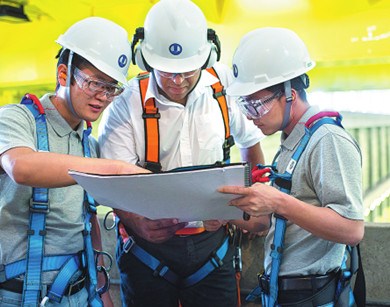
Technicians from China and Brazil discuss engineering plans for constructing a hydro plant by CTG Brasil. (Photo/China Daily)
CTG Brasil - the unit of China Three Gorges Corporation, the world's biggest dam builder and operator - said it will continue to expand its footprint in Brazil to support long-term growth there.
CEO Li Yingsheng said CTG Brasil has a clear, long-term vision of its investments in the Latin American country.
"We will continue to analyze opportunities in clean energy that present a fair rate of return and acceptable risks," Li said.
These opportunities not only lay in hydro, but also in solar and wind power.
"We are particularly interested in participating in clean, large-scale and greenfield hydropower projects, as those are part of our DNA," Li added.
Since its launch in 2013, CTG Brasil has invested 23 billion reals ($7.27 billion) in asset acquisitions and system upgrades in Brazil.
In its most recent expansion there, it paid $1.2 billion last year to acquire the Brazilian operations of Duke Energy, with installed capacity of 2,090 megawatts.
In 2015, it won a 30-year concession to operate two major Brazilian hydroelectric projects, the Ilha Solteira and Jupia plants, for a total investment of $3.7 billion.
To date, it has built up an asset portfolio which includes 17 hydropower plants, 11 wind farms and a trading company.
Li said that with total installed capacity now of 8.27 gW, his group was Brazil's second biggest private energy generator.
The CEO said that so far his group has a very successful experience in operating its assets in the country.
"We have built a high-quality portfolio and are committed to pursuing improvements, in order to ensure that our assets can continue to play a key role in Brazil's energy matrix," Li said.
CTG Brasil said it will invest 3 billion reals to promote modernization of the Ilha Solteira and Jupia hydropower plants, which were built four decades ago. The modernization work started in March 2017.
The close relationship between China Three Gorges Corporation and Brazil started even before CTG was established in China in 1993.
Brazil's experiences in hydro plant construction inspired CTG a great deal in its initial development stage, Li said.
"Our decision to enter the Brazilian market in 2013 was based on a long-term view," he said.
"That view was of the country's potential for combining Chinese and Brazilian expertise for the development and operation of large-scale renewable energy generation projects - which is our core business."
The company's management believes that the combination of China's and Brazil's expertise in clean energy projects is a key component of its corporate culture.
CTG Brasil has long been positioning itself as a local company in Brazil, rather than a foreign-invested company aiming to strengthen its development, Li said.
"From the beginning, CTG Brasil has established itself as a Brazilian company, with a mostly-Brazilian team," Li said.
"Less than 5 percent of our 800 employees are Chinese. Most of the Chinese team members are not in executive positions, but contributing to the operations by sharing our international expertise," he added.
CTG Brasil is not the only Chinese business to have consistently built up its presence in Brazil.
Figures from the China-Brazil Business Council show that China has been increasing its investments there over the past few years, with total investment of $8.4 billion in 2016, up 13 percent year-on-year. China's new investments in Brazil reached $6.18 billion in the first half of 2017.
China and Brazil are also taking measures to strengthen economic ties, aiming to promote long-term development.
The two nations signed a memorandum of understanding on Aug 1 to diversify service trade, and upgrade their commercial structures for commodity and goods exchanges.
The agreement was designed to encourage them to improve services trade in eight areas including engineering, architecture, e-commerce, banking automation and tourism to enrich bilateral trade ties over the next two years.


















































